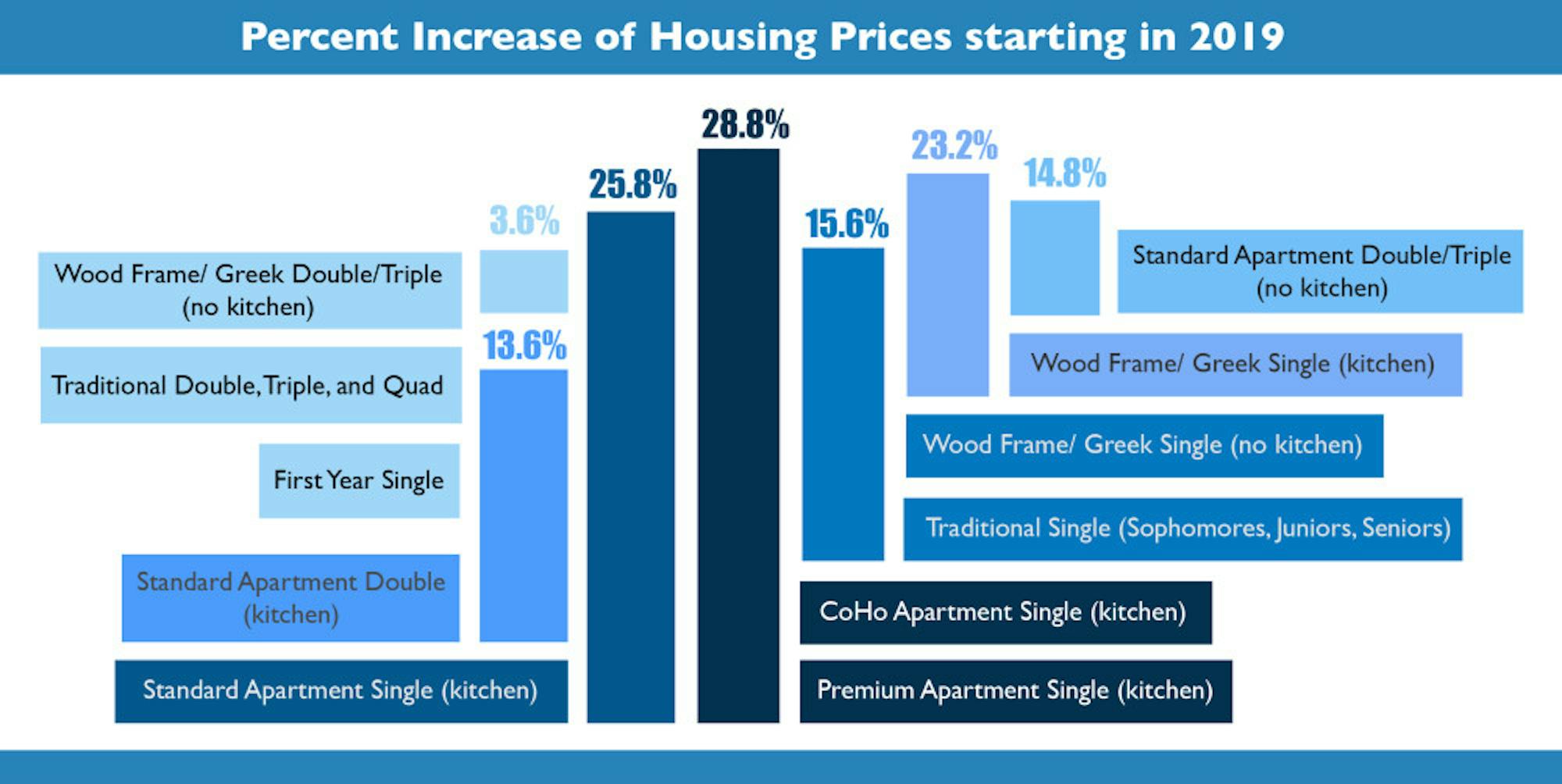Tufts Housing League (THL) met with Dean of Student Affairs Mary Pat McMahon, Associate Dean of Student Affairs Christopher Rossi and Director of Residential Life and Learning Joshua Hartman in Dowling Hall to discuss the tiered housing system on Sept. 19, according to Rossi.
The meeting was specifically intended to address the impact that Tufts' tiered housing system — scheduled to take effect in the upcoming 2019–20 academic year — will have on students with financial aid, according to an electronic message THL co-founder Nathan Krinsky provided to the Daily. Krinsky repeatedly asserted that the administration admitted to certain deficiencies in the tiered-housing program.
In an email to the Daily, Rossi characterized the meeting as productive, noting that he and the other administrators in attendance explained their reasoning behind the tiered-pricing system. He also emphasized Tufts' pledge to match financial need with aid.
“We discussed the university's continued commitment to meeting the full demonstrated financial need of all admitted and returning students, which includes considering the cost of each housing tier when determining students' financial aid award,” Rossi said.
The conversation remained civil and productive, according to THL member and senior Hannah Shin.
“The environment in the room was one of collaboration between both groups, with the administrators being as friendly as possible,” Shin said. “[THL members] maintained a demeanor of respect and openness while also being firm and asking clarifying questions.”
McMahon, Rossi and Hartman informed THL members that students receiving financial aid may be unable to determine if a rise in their annual bill or out-of-pocket costs is due to their choice to live in a higher-tier dorm or a reassessment of their financial situation, according to Krinsky.
“To this point, the administrators also admitted that the calculation of housing-based aid and tuition-based aid are complexly interconnected and could not guarantee that out-of-pocket housing costs for students on financial aid would remain the same year-to-year, as suggested in previous statements,” Krinsky said.
However, Rossi explained that any changes to the calculated family contribution of a student's financial aid package will not be connected to their decision to live in a higher-tier dorm.
"The University calculates aid by meeting need, defined as total cost (including tuition, fees, room, board, books, and personal expenses) minus family contribution, which is the amount that we calculate that the family can pay in a given year," Rossi said. "As a result, a student's aid is determined by subtracting the family contribution from the total cost - even if that total cost increases, e.g. room costs rise or a student chooses to live in a more expensive room. This is why we emphasize that students will not be penalized or given less aid due to the type of housing they select."
Rossi pointed to the university’s intent to keep stable out-of-pocket housing costs in cases where a student's financial circumstances remain the same.
“As outlined in our FAQs, we reiterated that out-of-pocket expenses for on-campus housing would remain the same for students on aid if all other financial circumstances are consistent with the previous year - regardless of the tier selected,” Rossi said.
The meeting's attendees also discussed the possibility of students relocating to a higher-tier dorm mid-year, a scenario for which the administration has not yet determined a plan to handle, according to Krinsky.
“The administrators admitted that they had no contingency plans in place to ensure that students forced to move into a ‘higher-tier’ dorm room mid-year would not be financially punished, and thus dissuaded from, that vital choice,” Krinsky said. “If a student needed to switch to a more expensive room for mental health or safety concerns, there is no guarantee that they would be exempt from the additional cost of such a decision.”
The administrators did not comment on these claims. According to Rossi, the administrators explained the rationale behind categorizing certain living options in different tiers.
“Kitchens in Hillside Apartments and Latin Way may provide the opportunity for students to drop their meal plan if they chose,” Rossi said. “Meanwhile, cultural and identity-based housing remains at the lowest single and double rate since students select those spaces for important reasons independent of amenities.”
THL members spoke on behalf of the Tufts student body, which the group said has not been sufficiently engaged by administrators about the tiered housing system during its yearlong development process.
“We advocated for the concerns of students and made sure that the emotional and physical reality of how housing shapes students' lives was not lost on the administrators,” Shin said.
The administrators lauded the multitude of issues THL has recently decided to tackle, according to Rossi.
“Mary Pat, Josh, and I expressed our appreciation for this group's thoughtful approach and diligence in addressing the nuanced relationship between on-campus housing capacity, tiered rates, the housing market in our host communities, financial aid, the University's values, and importance of providing space for students,” Rossi said.
The administrators also expressed a desire to continue working with THL and other similar groups on campus, according to Hartman.
"I am eager to work with THL and all students on campus to support and enhance our vibrant residential community," Hartman told the Daily in an email. "I am specifically excited to learn from all of our residential students about how our team can best be supportive."
Ultimately, McMahon, Rossi and Hartman agreed during the meeting to aid in facilitating conversations about tiered housing by holding a public forum open to the Tufts community in the near future, according to Krinsky.
“While we are pleased that the administration acknowledges the gravity of the broader housing crisis, Tufts Housing League remains adamantly opposed to the tiered housing proposal and will continue to organize the Tufts community against it," he said.
Tufts Housing League meets with administration, discusses tiered housing system






